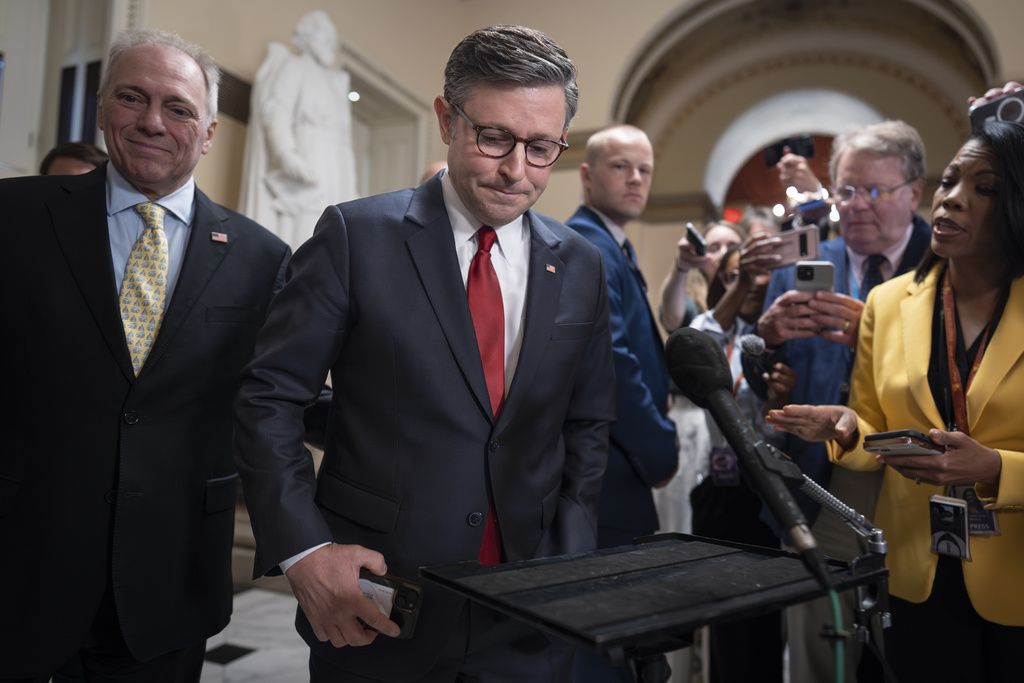
President Trump’s One Big Beautiful Bill Act stalled in the House on Wednesday as Republican leaders tried to pressure party holdouts to accept the Senate-passed changes to the legislation.
Republicans wanted to clear the package for the president’s signature by his self-imposed deadline of July Fourth.
House Freedom Caucus Chairman Andy Harris, Maryland Republican, said the bill won’t be ready by July Fourth but negotiations are continuing for a compromise.
“The House has a position, the Senate takes a position, and then we can come to an agreement somewhere in the middle,” he said. “That’s the way the process should work.”
House Republican leaders held hours of procedural votes as they negotiated with the holdouts, who had varying concerns but a unifying dislike of the version that the Senate passed Tuesday.
After the talks, House Speaker Mike Johnson, Louisiana Republican, could not get enough votes to start debate on the bill.
“This is such an important bill, and it’s important that we deliver as much as possible for President Trump, and we get it right and not rushed,” said Rep. Eric Burlison, Missouri Republican.
Mr. Trump and Vice President J.D. Vance met at the White House with various groups of Republicans to try to help whip support for the bill.
“They’re very convincing,” Rep. Tim Burchett, Tennessee Republican, said after returning to the Capitol. “We’re going to figure something out here.”
The centerpiece of the bill is a permanent extension of Mr. Trump’s first-term tax cuts for individuals and small businesses and new temporary tax breaks to fulfill his campaign promises of no tax on tips, overtime, Social Security and car loan interest.
The measure is chock-full of other Republican priorities, such as provisions to spur domestic energy production and funding for border security, immigration enforcement and the national defense.
However, the more than $1 trillion in spending cuts have split Republicans.
More moderate Republicans are worried about steeper Medicaid reductions that the Senate added to the bill, particularly a harsher crackdown on state provider taxes.
Fiscal hawks, concentrated mainly in the House Freedom Caucus, want more spending cuts across the board. They are upset about various last-minute changes in the Senate, particularly those that again slowed down the phaseout of clean energy credits after conservatives in the upper chamber secured provisions to expedite their repeal.
Mr. Burlison, a Freedom Caucus member, said he was prepared to block the bill because he wants to negotiate more spending cuts with the Senate.
He said the current version violates a promise to fiscal hawks that the bill would not increase the deficit after factoring in economic growth projections from the tax cuts and regulatory rollbacks.
More moderate members want to renegotiate the bill because they oppose the Senate’s changes to Medicaid.
However, some of those members were swayed to support the bill after hearing from Mr. Trump and administration officials during the White House meetings.
“Member concerns about Medicaid were substantially mitigated,” said Rep. Dusty Johnson of South Dakota, who chairs the Main Street Caucus, a group of roughly 80 House Republicans who call themselves “pragmatic conservatives.”
Mr. Johnson is not one of the holdouts, but he attended two hours of White House meetings to help facilitate dialogue on some of his colleagues’ concerns.
One of the “big” breakthroughs, he said, was a deeper explanation of a $50 billion rural health transformation fund the Senate added to the bill to help states that could lose funding as a result of the provider crackdown and other Medicaid changes.
Mr. Johnson said members from more suburban and urban districts were pleased to hear that funding would be used to help providers other than the rural hospitals that senators were focused on saving. The funding will be controlled by the Centers for Medicare & Medicaid Services, headed by Dr. Mehmet Oz.
“Hearing from Dr. Oz this morning and the president about the vision for how those dollars could be utilized was incredibly helpful,” Mr. Johnson said.
Also helpful was an explanation of the Senate changes to a provision on state-directed payments, one of the financing systems for Medicaid.
“These state-directed payments, these are new revenues,” Mr. Johnson said.
“In the final days of the Biden administration, the caps were raised. I mean, we’re going back to the caps as they existed in the Obama administration. It’s not as though hospitals have been relying on these revenues for 10 or 20 years.”
House Republican leaders cannot afford more than three defections. When the House voted on the first version of the bill in May, the leaders lost two Republicans: Reps. Thomas Massie of Kentucky and Warren Davidson of Ohio.
Mr. Massie still plans to vote against the Senate-passed bill, but Mr. Davidson announced Wednesday evening that he would support it.
“I initially voted against the House’s version of this bill because I believed some areas needed improvement. Unfortunately, I’ve come to the conclusion that if Congress doesn’t pass the bill this time around, the Senate’s version will get even worse,” Mr. Davidson said in a statement.
He cited Senate improvements, such as adding “bigger” changes to Medicaid, reducing the amount of state and local tax relief sought by Republicans from Democratic-majority states, from $350 billion to $220 billion, and eliminating a 10-year moratorium on regulating artificial intelligence.
Mr. Davidson also touted “major conservative wins” of pro-growth tax policy, border security funding, cuts to President Biden’s clean energy policies, new Medicaid work requirements and “enhanced” work requirements for the food stamp program, known as the Supplemental Nutrition Assistance Program.
Although he wanted more spending cuts, he said Republicans could use other tools, “such as the rescissions process, future budget reconciliation packages and the appropriations process to change course.”
















